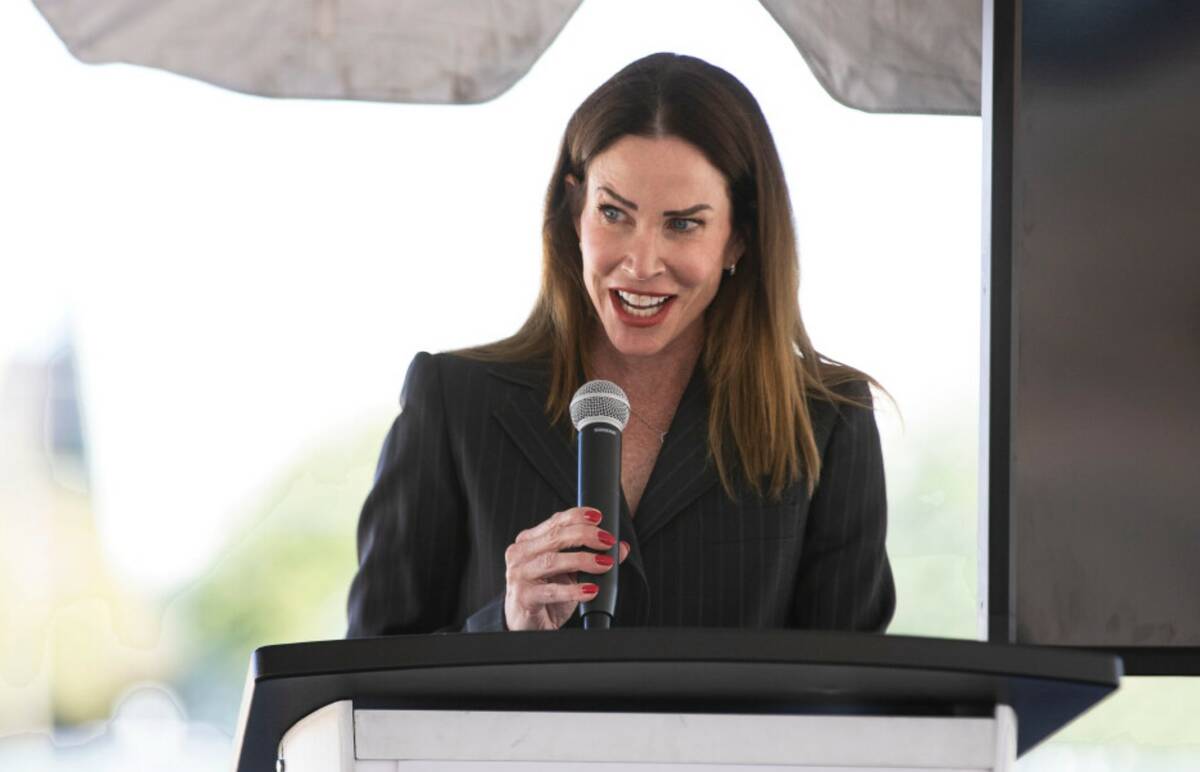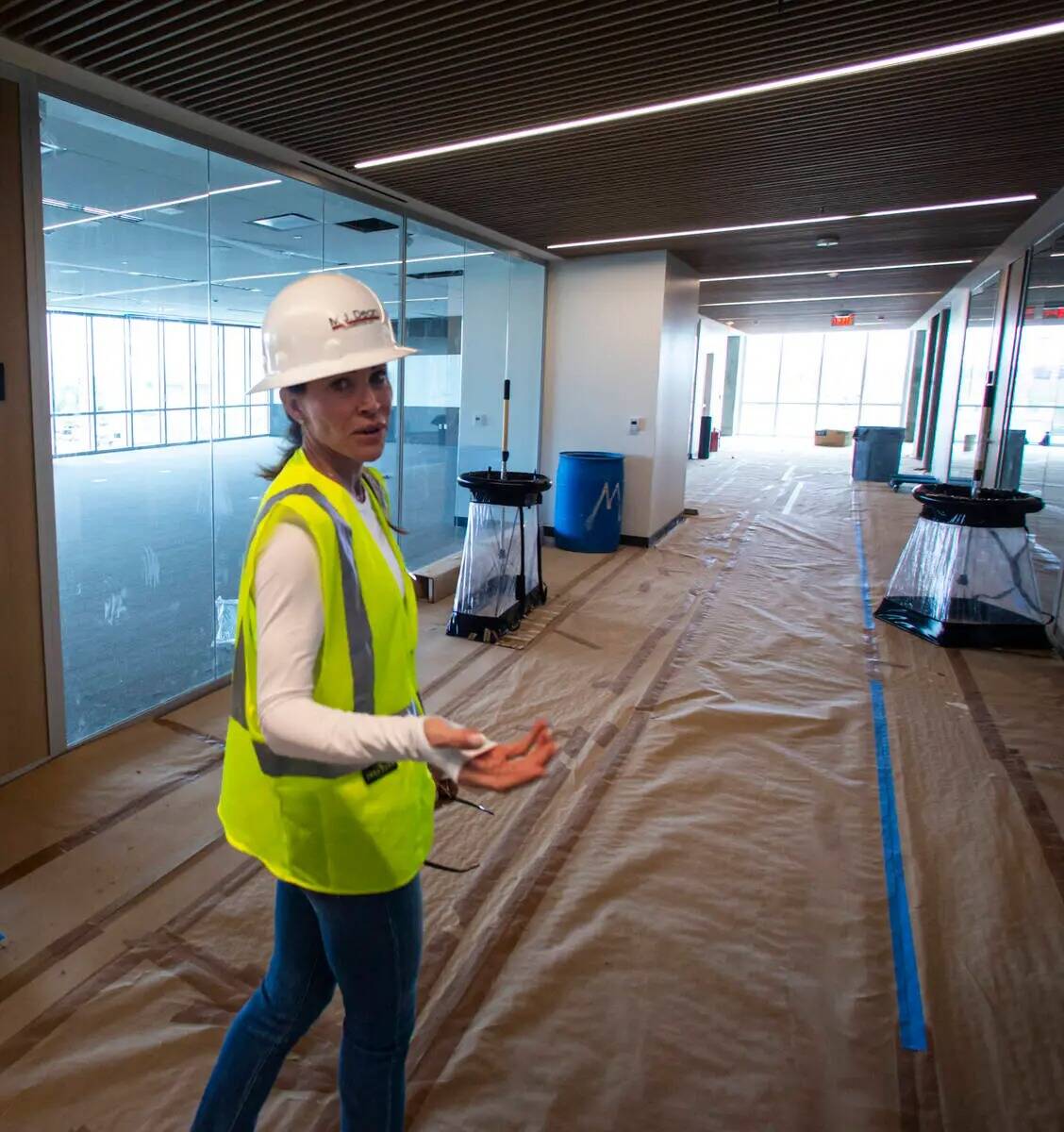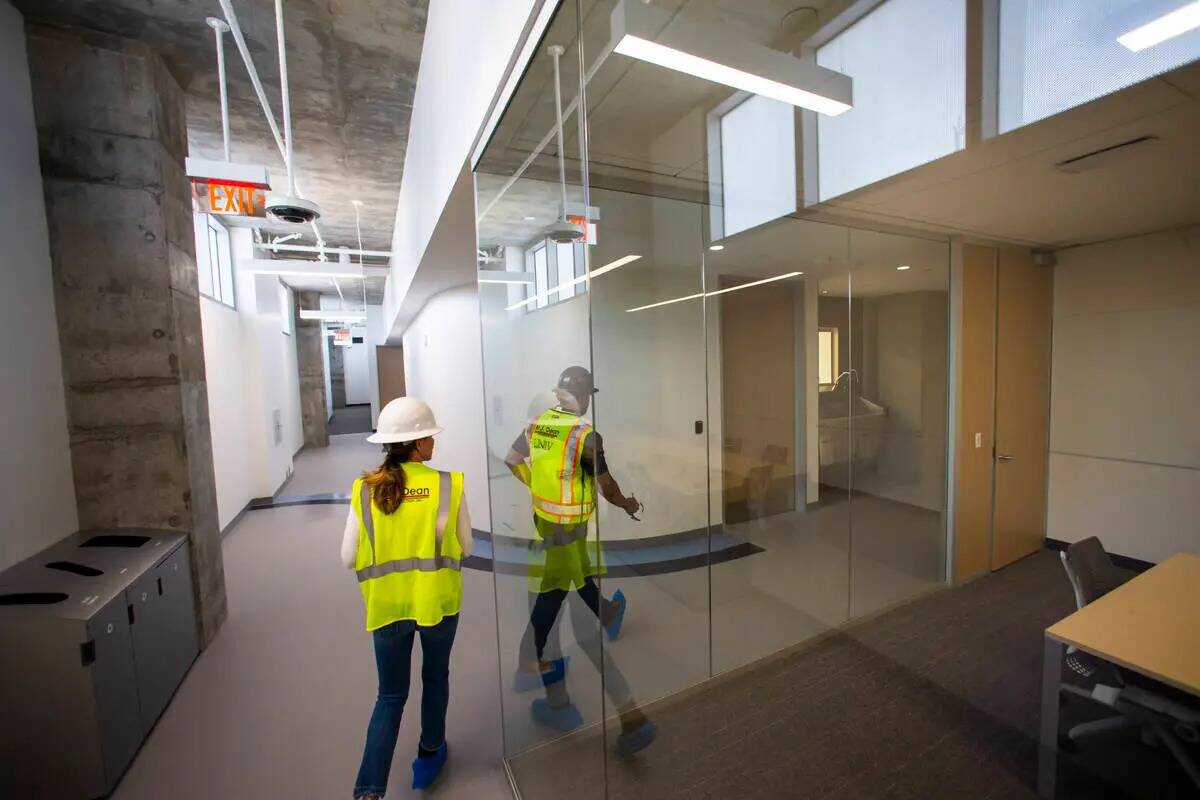Report alleges that UNLV staffer created hostile work environment
Former UNLV medical school chief of staff Maureen Schafer and her deputy created a hostile work environment that included discrimination, “fear and retaliation,” and the hiring of friends and family, a secret memo obtained by the Las Vegas Review-Journal alleges.
At least a half-dozen people complained about the actions of Schafer and Heather Bosano, then the human resources director, but the concerns were “not new” to top medical school officials and created a “significant liability” for the school, including at least one $30,000 settlement, the memo says.
Schafer was removed from her position soon after the Oct. 17, 2017, memo but remained involved in the funding and construction of the Kirk Kerkorian School of Medicine at UNLV building, including directing public money, through a nonprofit she runs.
Associate General Counsel Susan Carrasco O’Brien and Office of Compliance Director Barrett Morris detailed concerns in the memo to a number of top staff but misspelled Schafer’s last name throughout the document.
“The University, as an employer, needs to take steps to timely and accurately document performance deficiencies (i.e. take steps to remediate the issues) in order to later be able to defend itself in response to later charges of discrimination,” they wrote. “The University policies and practices, in this situation are not being consistently applied in that no other University employee has been permitted to engage in inappropriate and/or unprofessional behavior similar to that of Maureen Schaffer and/or Heather Bosano, without consequences.”
Schafer said she was out of the country and could not talk. Instead, she sent email responses on Tuesday that did not address the specific allegations about her actions.
“Processes exist so that employees are able to submit opinions and input … into a system that is then formally reviewed for clarity and transparency,” she wrote. “That process took place for all those items in the report — and I am proud of how it was all handled and concluded for everyone involved as we, including those named in the report all contributed to building an incredible medical school for the community.”
Morris, who is no longer with UNLV, said he does not remember the details of the report and does not know what the recommendations were after the report. But he said there were clearly concerns about the employee complaints, and he believes Schafer received special treatment because she was skilled at raising money.
“There were a lot of issues about financing and politics that had a lot to do with the decisions being made,” he said.
Schafer provided the Review-Journal with a phone number for Barbara Atkinson, who was the founding dean of the medical school from 2015 to 2019 and now consults for the nonprofit that Schafer runs.
Atkinson said Schafer handled herself professionally at a tough time and was responsible for getting an excellent building in place for the school.
“This is something that needs to be buried,” she said in a phone interview. “It was an unfortunate episode all around. All of that made-up junk is not what happened, and there was a mediated settlement that nobody is allowed to talk. She did not do those things when she worked for me.”
Atkinson conceded that Schafer was moved out of the school after the memo but could not say who made the decision or why.
Hiding the records
Last year, the Review-Journal learned of the memo, a report written in August 2017 and a school climate survey. But UNLV repeatedly refused to provide the records, violating state open records laws, said Ben Lipman, the paper’s chief legal officer.
“It has been disappointing to see the University fight so hard to withhold the records,” he said. “At one point, the University refused to provide records claiming they did not know what records to look for because they supposedly did not know the meaning of common words and phrases like ‘reports’ or ‘claims’ against the University or ‘misconduct’ or ‘employment issues’ or ‘the name of the person who received a payment.’”
After the newspaper provided the name and date of the documents, UNLV said only that the records were not public.
“In addition, the University categorically withheld records in their entirety claiming they were personnel records that were entirely confidential,” Lipman said. “But the law does not make personnel records confidential just because they are personnel records. Even if there is some confidential information involved, at most, that information can be redacted, but the rest of the record must be released.”
While the university continued to withhold the 2017 memo, someone sent it anonymously to the Review-Journal after the newspaper published a “What are they hiding?” column about the fight to acquire the records.
Less than two months after the memo, Schafer, who started in the job in 2014, was moved to director of special projects for a year, her LinkedIn page shows. She then left UNLV for the private Nevada Health & Bioscience Corp., which continued to fund construction of the medical school building using public and private money, the LinkedIn profile and a state audit shows.
Bosano said Thursday that she was never informed of the memo, the climate survey or any of the allegations, and that she did not participate in or witness any inappropriate behavior by Schafer.
“I wasn’t aware of any of this,” she said after the Review-Journal provided her a copy of the memo. “None of the things listed in the memo — they didn’t happen. We never had conversations about this, and I was never notified of any of this.”
The memo was sent to Diane Chase, then executive vice president and provost, and Shawn Gerstenberger, who at the time was acting medical school dean. General Counsel Elda Luna Sidhu, special counsel to the president Nancy Rapoport and then-chief human resources officer Larry Hamilton were copied. Rapoport, who is a professor at Boyd Law School, declined to comment, citing personnel issues. The others either did not respond to calls or could not be reached for comment.
Six months of complaints
The memo lists 11 complaints against Schafer and Bosano, based on Schafer’s direction, between April 6, 2017, and Oct. 4, 2017, including circumventing the university’s hiring process to institute a “friends and family” hiring plan, discriminating based on age and race, and retaliating against employees who complained.
“There has been, over the course of time, an incremental movement from anecdotal information regarding Ms. Schaffer’s and Ms. Bosano’s inappropriate and unprofessional behavior to (a) full blown line of individuals with concrete examples of how he/she has been subjected to inappropriate and/or unprofessional behavior by Ms. Schaffer and/or Ms. Bosano, in part based upon a protected class basis and/or in retaliation for raising concerns, without repercussions,” the memo says.
Examples in the memo include:
— Pam Udall, who headed communications, was forced into a job where she would lose her benefits when she complained that Schafer turned down people Udall wanted to hire. Udall’s complaint was settled with a $29,180 payout. She declined to comment when reached by the Review-Journal, citing a nondisclosure agreement she said she signed.
— Anita Prince expressed concerns about salary inequities between her and another employee, who was allegedly a friend of Bosano’s, with the same title on June 2, 2017, and two weeks later Schafer and Bosano requested that her contract be terminated for “performance deficiencies.” Prince did not return calls from the Review-Journal. Bosano said the person hired was in a different role than Prince.
— An Aug. 29, 2017, climate survey of the school, which UNLV also refused to release under open records laws, alleged inappropriate and flirtatious behavior by Dr. Parvesh Kumar and search process violations that were called Schafer’s “Friends and Family hiring plan.” It also said Schafer is “rude, lacks people skills, demeans and is derogatory to people in front of others and is quite hostile to anyone who dares to tell her what she does not want to hear.”
Kumar, a professor of oncology, told the Review-Journal that he “was shocked by this” allegation against him and that it was false.
“Barrett Morris looked into this and found nothing,” he said.
Morris said he did not recall Kumar being part of the climate survey and did not know what happened with any allegations against him.
Other complainants named in the report could not be reached for comment or declined to comment.
In 2018, the Review-Journal reported that Schafer authorized a $50,000 payment to a college friend without any apparent work being done for the money. Atkinson defended the contract, saying that work was done.
Funding controversies
The funding for the medical school has had a series of controversies.
The estate of wealthy businessman and philanthropist Kerkorian donated $25 million to the school, which bears his name, with the provision that his name not be revealed as the donor. The Legislature matched the donation.
But foundation staff circulated copies of the check so widely that it leaked to the Review-Journal. Instead of fixing its internal security processes, the school spent thousands of taxpayer dollars hiring a law firm to try unsuccessfully to find the Review-Journal’s source.
In 2021, the Legislature reinstated $25 million in state funding for the school after it was rescinded from the budget during the COVID-19 pandemic.
But the public money was routed through Schafer’s corporation, raising concerns from auditors last year that the “non-traditional construction” method may not be allowed under state law.
Since “the institution does not have a contract with the general contractor, it loses some control over the management of the project, including accountability for the use of state appropriated funds and the right to modify the project as needed,” auditors wrote. “In addition, it is unclear under state law whether institutions have authority to use the (private-public partnership) method when procuring capital construction projects.”
State law allows private-public partnerships for construction of transportation facilities, but UNLV should get an opinion to determine if they are appropriate for non-transportation facilities, the auditor said.
Contact Arthur Kane at akane@reviewjournal.com and follow @ArthurMKane on Twitter. Kane is editor of the Review-Journal’s investigative team, focusing on reporting that holds leaders and agencies accountable and exposes wrongdoing.


























